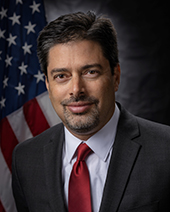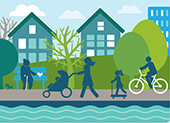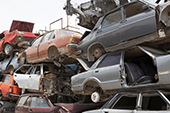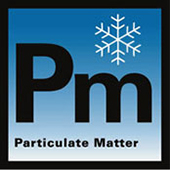|
|

|
|
|
|
February 2023 l Volume 2023-1
|
|
|
|
|
|
|
In this issue, you’ll find articles about the appointment of Dr. Philip Fine as the Air District’s new executive officer, a grant from the U.S. EPA to the Air District for air monitoring in East Oakland and funding available through the Air District’s Vehicle Buy Back program for Bay Area residents. Other articles cover the Air District’s support for the U.S. EPA’s proposed revisions to the PM health standard, a recent Climate Tech Finance program loan guarantee, the Air District’s presence at the November COP27 climate conference and a recent penalty assessed to Tesoro Refining and Marketing Company. Current grant opportunities are also summarized.
|
|
|
|
|
|
|
|
|
|
|
|
|
|
Air District Board Confirms Dr. Philip Fine as New Executive Officer
|
|
| | |
|
In December, the Air District’s Board of Directors confirmed the appointment of Dr. Philip Fine, an internationally recognized expert in air quality science and policy, as the agency’s new executive officer, effective February 21. Dr. Fine joins the Air District from the U.S. Environmental Protection Agency, where he has served as principal deputy associate administrator for policy, a presidentially appointed position. As EPA’s Environmental Justice Officer, he led the Office of Environmental Justice through a period of unprecedented attention, action and growth, including the implementation of President Biden’s Justice40 initiative.
As executive officer for the Air District, Dr. Fine will manage the agency’s overall functions and activities, including policy development, administration, enforcement, permitting, technology development, planning, grant allocation and engagement with communities disproportionately impacted by air pollution to address environmental justice concerns.
Prior to his time at the U.S. EPA, Dr. Fine served for 15 years at the South Coast Air Quality Management District in Southern California. He last served as the deputy executive officer for the Planning, Rule Development & Area Sources Division. Prior to this role, Dr. Fine’s previous responsibilities at South Coast Air Quality Management District included oversight of ambient air monitoring, laboratory services, quality assurance and source testing.
Before joining the South Coast Air Quality Management District, Dr. Fine was a research assistant professor at the University of Southern California, Los Angeles, where he taught courses and conducted extensive research on particulate pollution, air monitoring technologies and exposure assessment. He received his Ph.D. from the California Institute of Technology in Environmental Science & Engineering, and his bachelor’s degree in Mechanical Engineering and Materials Science & Engineering from the University of California, Berkeley.
|
|
|
|
|
|
|
|
|
|
|
|
Air District Receives U.S. EPA Grant for Community Air Monitoring in East Oakland
|
|
| | |
|
The Air District has received a $298,114 grant from the U.S. Environmental Protection Agency to enhance air quality monitoring in the Bay Area. The Air District is partnering with Communities for a Better Environment to implement the project funded by this grant in East Oakland, a densely populated community faced with a high air pollution burden.
The grant will enable the Air District to use an air monitoring van to perform exploratory measurements of pollutants and conduct studies. In addition, a network of air sensors and filtration units will be deployed to community members and schools, who will be trained to interpret data and respond to air quality emergencies, such as wildfire smoke events.
The grant is part of the largest investment for community air monitoring in U.S. EPA history and is funded through President Biden’s Climate and Economic Plans and the Justice40 Initiative. The Biden-Harris Administration created the Justice40 Initiative to confront and address decades of underinvestment in disadvantaged communities, by directing resources to communities most impacted by climate change, pollution and environmental hazards.
Communities for a Better Environment builds people’s power in California’s communities of color and low-income communities to achieve environmental health and justice. This is achieved by preventing and reducing pollution and building green, healthy and sustainable communities and environments.
|
|
|
|
|
|
|
|
|
|
|
|
Air District Offers $1,200 to Scrap Old Cars Through the Vehicle Buy Back Program
|
|
| | |
|
The Air District is providing incentives of $1,200 through the Vehicle Buy Back Program for Bay Area residents to scrap 1998 and older vehicles to improve local air quality. The program pays owners of older, high-polluting cars and small trucks to voluntarily retire their vehicles. Older vehicles lack modern emission-control technology and pollute at a higher rate than newer models.
Transportation remains the largest source of air pollution in the Bay Area, and scrapping older vehicles helps limit harmful tailpipe emissions.
Eligibility requirements for the Vehicle Buy Back Program include:
- Vehicle must be 1998 model year or older
- Vehicle must be currently registered as operable and must be drivable
- Vehicle must have been registered in the Bay Area for the past 24 months
- Vehicles within 60 days of a required smog check must take and pass the smog check
The Vehicle Buy Back Program reduces air pollutants from vehicle exhaust, including fine particles and ozone precursors, the main ingredients in smog. These pollutants contribute to respiratory diseases and increased mortality rates. Retiring older vehicles also reduces carbon dioxide, a potent greenhouse gas that contributes to climate change.
Since 1996, the Air District’s Vehicle Buy Back program has retired over 90,000 cars, vans, pickup trucks and SUVs. For each pre-1998 vehicle removed from Bay Area roads, an estimated 75 pounds of air pollution is annually prevented from being emitted into the air. In 2021, 3,000 vehicles were retired, representing the removal of 91 tons of air pollution.
The State of California operates a complimentary program offering eligible consumers vehicle retirement options for vehicles that do not pass smog check, the Consumer Assistance Program.
To find out more about the Vehicle Buy Back program, visit www.baaqmd.gov/vbb.
|
|
|
|
|
|
|
|
|
|
|
|
Air District Supports EPA’s More Stringent Health Standard for Particulate Matter
|
|
| | |
|
In January, the Air District announced its support for proposed revisions to the the U.S. Environmental Protection Agency’s National Ambient Air Quality Standards for particulate matter pollution. The Clean Air Act requires the U.S. EPA to set National Ambient Air Quality Standards for pollutants considered harmful to public health and the environment. Air quality standards define the maximum amount of these pollutants that can be present in ambient air for it to be considered healthy to breathe.
The EPA has proposed lowering the annual standard for particulate matter from 12 to a level between 9 and 10 micrograms per cubic meter of air.
“The Air District wholeheartedly supports the U.S. Environmental Protection Agency’s recent move to strengthen the National Ambient Air Quality Standards for particulate matter,” said Sharon Landers, interim executive officer of the Air District. “As air quality impacts in our communities increase with the changing climate, more stringent standards are a critical tool to protect public health. This bold and informed action by EPA signals a return to relying on the latest science and will help protect the health of all Bay Area residents, especially those living in communities disproportionately impacted by air pollution.”
In 2019, the Air District and its Advisory Council convened the Particulate Matter Symposium Series to facilitate a discussion among nationally recognized scientists and stakeholders to consider the current state of particulate matter science. A major finding was that, while the Bay Area has made significant progress at reducing levels of particulate matter, more stringent standards are needed to protect public health.
Particulate matter is the most significant driver of health risks from Bay Area air quality. Exposure to particulate matter has been linked to serious respiratory illnesses and increased risk of heart attacks and is especially harmful for children, the elderly and those with respiratory conditions.
|
|
|
|
|
|
|
|
|
|
|
|
Air District’s Climate Tech Finance Program Makes One-Stop Shop for Electric Vehicles a Reality
|
|
| | |
|
The Air District has awarded a loan guarantee to Zevvy, formerly Flux EV, an electric vehicle leasing solution with flexible lease agreements designed to save drivers in the Bay Area money on gas and maintenance costs when they choose an EV over a gas-powered vehicle. Zevvy’s pay-by-the-mile lease product allows drivers to customize their terms and allows them to try an EV without the high initial cost or long-term commitment of a loan, or barriers like mileage caps that come with traditional leases and subscription services.
Zevvy customers pay a low monthly fee and only a few cents for every mile they drive, saving money compared to what they would spend on fuel and maintenance for a traditional internal combustion engine car. When the lease term is up, they have the option to return their EV, renew it month-to-month, or buy it outright, applying all mileage fees paid to the purchase price of the car.
This loan guarantee is the most recent project under the Air District’s Climate Tech Finance program. In partnership with the California Infrastructure and Economic Development Bank and the Northern California Financial Development Corporation, the Climate Tech Finance team led an impact assessment that deemed Zevvy eligible for a multimillion-dollar loan guarantee. This loan guarantee supported Zevvy in securing a line of credit with California Bank of Commerce.
The core value of the Climate Tech Finance program is to support innovative climate projects. The Air District’s greenhouse gas analysis ensures that these new technologies will reduce short- and long-term greenhouse gas emissions.
The Climate Tech Finance loan guarantee provides a credit enhancement that supports Zevvy’s operational and technical capacities in the near term, thereby allowing the company to expand access to electric vehicles for thousands more drivers across California. Zevvy’s rapid growth is estimated to reduce 494,000 metric tons of carbon dioxide equivalent emissions per year in California, by eliminating the use of internal combustion engine vehicles and therefore reducing harmful emissions of particulate matter and smog-forming pollutants.
|
|
|
|
|
|
|
|
|
|
|
|
Air District Represented Bay Area at COP27
|
|
| | |
|
This fall, the Air District sent Board and staff representatives to attend the United Nations Climate Change Conference, or COP27, which was held in Sharm El Sheikh, Egypt, from Sunday, November 13 through Friday, November 18. Throughout the conference, Air District Board Chair John Bauters and Vice-Chair Davina Hurt conducted a series of Twitter Live events to provide ongoing information. Bay Area residents were invited to join the discussion, ask questions and share their concerns by connecting with the Air District on Twitter and Facebook.
COP27 brought the world’s leaders together to accelerate the implementation of climate protection strategies. Participation in the climate conference enabled the Air District to learn about innovative technologies that are being deployed, and policies that are being enacted, around the world that can be replicated in the Bay Area. The Air District also shared agency knowledge, successes and strategies that have helped mitigate climate change at the local level.
COP27 built on the outcomes of COP26 to address the urgent need to reduce greenhouse gas emissions and build resilience and adaptation to the climate impacts the world is already beginning to face.
|
|
|
|
|
|
|
|
|
|
|
|
Air District Fines Tesoro Refining & Marketing Company
|
|
| | |
|
The Air District has fined Tesoro Refining & Marketing Company $1,469,579 for air quality violations at its Martinez refinery. The resolution of the case involved an extensive investigation into periodic, brief exceedances of the Air District’s hydrogen sulfide emissions standards at one of Tesoro's ground-level monitoring stations located on Waterfront Road along the border between the refinery and the Point Edith Wildlife Area, approximately two miles from any residential zone. Hydrogen sulfide is a colorless gas known for its pungent “rotten egg” odor at low concentrations.
The Air District’s investigation determined the causes of the emissions issues, which included recovered oil tank leaks, wastewater treatment system leaks and wastewater pond management deficiencies. The penalty also covers certain other related emissions violations. In some cases, drought-induced emissions of H2S from the Point Edith Wildlife Area may have contributed to the emissions exceedances.
In addition to the payment of civil penalties, the Air District has required Tesoro to:
- correct operational issues with the recovered oil tanks and shut down their use entirely by the end of 2024;
- implement structural and operational improvements to the wastewater treatment system;
- implement ongoing operational and management plans to prevent future emissions from the wastewater management system ponds;
- install and operate a new ground-level monitoring system at the border of the refinery near the community of Clyde, to better monitor emissions that might affect the community; and
- conduct ongoing investigations to determine the cause of any potential future emissions exceedances at the Waterfront Road monitor.
The resolution of the case also includes penalties for emissions violations at Tesoro's Pacheco Slough monitoring site, which occurred while Tesoro was conducting required soil remediation work.
All violations included in this case have been corrected.
The Air District issues Notices of Violation when facilities violate a specific air quality regulation or rule. Violators are generally required to respond to the notice within 10 days and submit a description of the actions they will take to correct the problem. These actions can include shutting down certain operations immediately or changing operations or equipment to come into compliance.
All penalty funds will be used to fund Air District activities, such as the agency’s inspection and enforcement efforts.
|
|
|
|
|
|
|
|
|
|
|
|
Air District Offers Millions in Grants
|
|
| | |
|
The Air District administers a number of grant funding programs that offer incentives for clean air projects. Grant Funding for Clean Air Projects
Grant programs for Bay Area businesses and public agencies:
- Grants for Heavy-Duty Mobile, Portable, and Stationary Equipment Replacement Projects and Installation of Zero-Emission Infrastructure – Over $100M* in funding is available for eligible projects that reduce toxic air emissions and ozone-forming pollutants through the scrap and replacement of older, high-polluting vehicles and equipment. Eligible project categories include, but are not limited to, upgrades or replacements of:
- School buses, transit buses, and shuttles
- Heavy-duty trucks, emergency vehicles, and transportation refrigeration units (TRUs)
- Off-road construction, industrial, and agricultural equipment, for example: dozers, forklifts, tractors, ag pumps, and portable or stationary engines
- Off-road port and freight equipment, including cargo-handling equipment and airport ground support equipment
- Marine vessel engines and locomotives
- Charging and refueling infrastructure that supports zero-emission vehicles, including battery-electric and hydrogen fuel-cell vehicles
*Available funding is based on the Air District’s current, best estimate for availability through 2023 and will be updated accordingly as funds are awarded and new funding sources are secured. Projects are funded by the Carl Moyer Program, Community Air Protection Program, Transportation Fund for Clean Air, Goods Movement, Mobile Source Incentive Fund, and Funding Agricultural Replacement Measures for Emission Reductions (FARMER) program.
Applications are accepted on a first-come, first-served basis, with a portion of available funding prioritized for projects that operate in or that benefit disadvantaged and low-income areas, and areas that are most highly impacted by air pollution, including the AB 617-identified communities of West Oakland, Richmond-San Pablo, East Oakland/San Leandro, Eastern San Francisco, Pittsburg-Bay Point area, San Jose, Tri-Valley area, and Vallejo. Apply at www.baaqmd.gov/funding-and-incentives.
- Climate Tech Finance Loan Guarantee Program is available to support the development and purchase of climate technologies for small businesses in California. Climate entrepreneurs can apply for loan guarantees up to 80 percent of the loan principal or $5 million, whichever is less, to accelerate the growth and impact of their businesses. This program is open and accepting applications now. https://ctf.baaqmd.gov/
- Charge! grant program helps offset the cost of purchasing and installing electric vehicle charging stations within the Air District’s jurisdiction, including new publicly available charging stations at qualifying facilities and new charging stations that serve multi-family housing facilities. The solicitation period opened on November 15, 2022, and applications are due by March 3, 2023. The solicitation will be competitive, which means that all complete applications will be scored and ranked. There will be $5 million in funding available to qualified applicants. For more program details and information about the deadline to submit applications, please visit: www.baaqmd.gov/charge
Grant programs available to Bay Area residents:
- Passenger Car and Light-Duty Truck Retirement – The Vehicle Buy Back Program pays Bay Area residents $1,200 per vehicle to turn in their operable, registered, model year 1998 and older passenger car or light-duty truck for scrapping. www.baaqmd.gov/vbb
- Clean Cars for All Program, Light-Duty Vehicle Replacement – The Clean Cars for All Program is open to income-qualified Bay Area residents in qualifying zip codes. The program provides grants of up to $9,500 to retire older, high-polluting vehicles and replace them with a new or used conventional hybrid, plug-in hybrid, fuel-cell, or electric vehicle. Residents that don’t want to purchase a replacement vehicle can receive $7,500 towards alternative mobility options (e.g. public transit or electric bicycles). www.baaqmd.gov/cleancarsforall
Other state-wide grant programs funded by Volkswagen NOx Mitigation Trust (only the first is administered by the Bay Area Air District):
- VW Zero-Emission Freight and Marine Program – Funding is available statewide to accelerate the replacement of older, higher polluting diesel engines with zero-emission technology. Approximately $25 million in Volkswagen Environmental Mitigation Trust funding is available for projects that do one or more of the following:
- Scrap combustion-based airport ground support equipment and replace with all-electric,
- Scrap combustion-based heavy-lift forklifts (> 8,000 pounds of lift capacity) and replace with all-electric,
- Scrap combustion-based port cargo-handling equipment and replace with all-electric,
- Scrap combustion-based ferry, tugboat, or towboat engines and replace with all-electric, and/or
- Install portside shore power systems at berths for use by unregulated oceangoing vessels.
75 percent of funding will be awarded to projects that reduce emissions in California’s disadvantaged and low-income communities. This solicitation is open and accepting applications on a first-come, first-served basis until all funds are fully allocated. https://www.californiavwtrust.org/zero-freight-marine/
- VW Combustion Freight and Marine Projects – Funding is available statewide to accelerate the replacement of older, higher polluting diesel engines with the cleanest available technologies. Equipment eligible for replacement includes Class 7 and 8 freight trucks (including waste haulers, dump trucks, and concrete mixers) or their engines (2012 model year and older) that are compliant with current regulations; freight switcher locomotives or their engines (pre-Tier 1); and ferry, tugboat, and towboat engines (pre-Tier 3). This solicitation is open and accepting applications on a first-come, first-served basis until all funds are fully allocated. https://xappprod.aqmd.gov/vw/combustion.html
- VW Zero-Emission Class 8 Freight and Port Drayage Trucks - This category is intended to support the expansion of zero-emission truck availability in the heaviest weight class. Vehicles eligible for replacement include Class 8 freight trucks (including drayage trucks, waste haulers, dump trucks, and concrete mixers) or their engines (2012 model year and older). This solicitation is open and accepting applications on a first-come, first-served basis until all funds are fully allocated. https://xappprod.aqmd.gov/vw/zero-emission.html
- VW Zero-Emission Transit and Shuttle Buses – The second installment of VW funding is available to owners of bus fleets that operate in California to support early adoption of zero-emission bus technologies to reduce harmful exposure for the state’s most sensitive populations. This program is administered by the San Joaquin Valley Air Pollution Control District. The zero-emission school bus bin is now oversubscribed. This solicitation is open and accepting applications for transit and shuttle buses on a first-come, first-served basis until all funds are fully allocated. http://vwbusmoney.valleyair.org/
|
|
|
|
|
|
|
|
|
|









